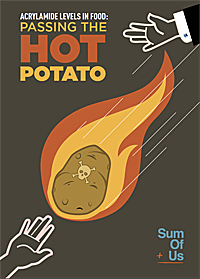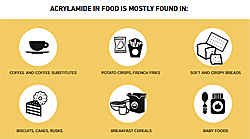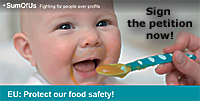At particular risk: Babies and infants.
Most people don't realise that much of their food is killing them, and that trips to fast-food outlets as a 'treat' for their children; is putting them in harms way!
Shockingly, baby-food products (e.g. Rusks) as well as fast food chains in the form of french fries and coffee. Crisps and the likes of Pringles contain some of the highest levels of a carcinogenic chemical.
 Whilst the incidents of child-hood cancers are on the increase, soft rules and self-regulation fails to protect us and has done for years, thanks to lobbyists paid by McDonalds, Burger King, Taco Bell and Pizza Hut; who have been pushing hard for weak guidelines.
Whilst the incidents of child-hood cancers are on the increase, soft rules and self-regulation fails to protect us and has done for years, thanks to lobbyists paid by McDonalds, Burger King, Taco Bell and Pizza Hut; who have been pushing hard for weak guidelines.
However, a newly published report analyses the information released by the European Food Safety Agency (EFSA) on the levels of acrylamide, a carcinogenic chemical, found in many day-to-day foods such as bread, coffee, biscuits, crisps and baby foods consumed in Europe. It also looks at the measures that business operators in the agricultural, manufacturing and hospitality sectors can implement across the food chain to prevent the formation of acrylamide.
This well-sourced research document concludes with a set of recommendations to improve the legislative proposal currently under discussion in the European Union to regulate the presence of acrylamide in food to provide sufficient protection to consumers.
Whilst the EU is tackling this problem, albeit so far via an unsatisfactory voluntary code, there is no UK government intention to retain any EU food protection legislation once we leave the EU. Indeed, their Red Tape Challenge policy continues to this day with the aim of removing legislation which curtails the activities of business, irrespective of the damage to the health and well-being of the public.
 The campaign group Sum Of Us have produced a detailed report on one of the most insidious chemicals found in our food. Indeed, under pressure from Sum Of Us, the EU Commissioner has delayed the vote on the weak, industry-written proposal. But he is still meeting with member states to decide how to proceed.
The campaign group Sum Of Us have produced a detailed report on one of the most insidious chemicals found in our food. Indeed, under pressure from Sum Of Us, the EU Commissioner has delayed the vote on the weak, industry-written proposal. But he is still meeting with member states to decide how to proceed.
Sum Of Us explains:
Acrylamide is a dangerous carcinogenic substance that is found in many foods that we eat every day: from potato crisps to toast, biscuits and even baby food. Last year’s scientific opinion from the European Food Safety Agency (EFSA) warned that acrylamide is a public health concern, as “it potentially increases the risk of developing cancer in consumers of all ages”. Children and babies are particularly vulnerable.
The levels of carcinogenic acrylamide can be significantly limited, but this hasn’t been the case so far: despite the years of monitoring, the levels of acrylamide in food have not been going down. Even worse, a lot of food producers were not aware of this problem at all or were not willing to take any measures to reduce it.
And the draft laws aren't just meaningless. Worse than that: the recommended acrylamide levels are in many cases actually higher than current amounts found in food, and the laws block countries bringing in tougher rules. That’d be a huge win for irresponsible food giants.
With basic measures, levels of the substance called acrylamide in our food can be dramatically reduced. But leaked EU legislation shows that corporate lobbyists are using a backroom committee procedure to prevent any real action. Under the proposal, acrylamide would be regulated through easily ignored-voluntary guidelines that won’t decrease the dangers at all.
Some of the undisputed facts around the carcinogenic contaminate in our food in the report are:
• There continues to be no substantial trend across food groups towards lower levels of acrylamide. While trend analysis across major food categories suggests a slight downward trend for acrylamide levels in potato crisps and snacks, crisp bread, biscuits and crackers, acrylamide levels in French fries, gingerbread and roasted coffee suggest concentrations are unchanged or increasing;
 • A very significant proportion of food products placed on the market (2,200 or 12% of the total) presented unacceptably high levels of acrylamide above the current benchmark set by the European Commission 4 . The percentage of food samples above the benchmark levels was similar for food samples produced outside and within the European Economic Area;
• A very significant proportion of food products placed on the market (2,200 or 12% of the total) presented unacceptably high levels of acrylamide above the current benchmark set by the European Commission 4 . The percentage of food samples above the benchmark levels was similar for food samples produced outside and within the European Economic Area;
• The highest acrylamide concentrations at 38,000 and 7,900 μg/Kg were found in a sample of instant coffee in Belgium and a sample of French fries in Denmark. These are 42 and 13 times higher than the current EC benchmark for these products;
• The highest acrylamide concentrations for food products targeted at babies were 1905, 1508 and 582 μg/Kg. These were found in samples of baby rusks, baby foods and in processed cereal baby products taken in Germany, UK and the Czech Republic respectively. These levels are 10, 30 and 12 times higher than the current EC benchmarks for these products. In 2014, 12% and 28% of baby foods and processed cereal foods for infants respectively exceeded the EC benchmark;
• The countries with the largest percentage of samples with levels of acrylamide above the current EC benchmark were: Greece (75%), Estonia and Sweden (20%), Belgium and Ireland (18%), Italy (17%), Norway (16%), Austria (15%), Spain and Finland (14%). EXECUTIVE SUMMARY This report analyses the information released by the European Food Safety Agency (EFSA) on the levels of acrylamide, a carcinogenic chemical, found in many day-to-day foods such as bread, coffee, biscuits, crisps and baby foods consumed in Europe.
 The report, available from this website's E-Library Database, is part of the pressure group's campaign to put pressure on MPs and MEPs to ensure that action is taken to introduce mandatory legislation which will mean that up to 95% of acrylamide in our food can be eliminated.
The report, available from this website's E-Library Database, is part of the pressure group's campaign to put pressure on MPs and MEPs to ensure that action is taken to introduce mandatory legislation which will mean that up to 95% of acrylamide in our food can be eliminated.
In addition to the campaign group's scientific evidence, they are urging the public to sign their on-line petition in order to put pressure on MPs and MEPs to force the introduction of legislation which will, for the first time, address this scandal of food industry poisoning our food knowingly!


 Whilst the incidents of child-hood cancers are on the increase, soft rules and self-regulation fails to protect us and has done for years, thanks to lobbyists paid by McDonalds, Burger King, Taco Bell and Pizza Hut; who have been pushing hard for weak guidelines.
Whilst the incidents of child-hood cancers are on the increase, soft rules and self-regulation fails to protect us and has done for years, thanks to lobbyists paid by McDonalds, Burger King, Taco Bell and Pizza Hut; who have been pushing hard for weak guidelines.
 • A very significant proportion of food products placed on the market (2,200 or 12% of the total) presented unacceptably high levels of acrylamide above the current benchmark set by the European Commission 4 . The percentage of food samples above the benchmark levels was similar for food samples produced outside and within the European Economic Area;
• A very significant proportion of food products placed on the market (2,200 or 12% of the total) presented unacceptably high levels of acrylamide above the current benchmark set by the European Commission 4 . The percentage of food samples above the benchmark levels was similar for food samples produced outside and within the European Economic Area; 